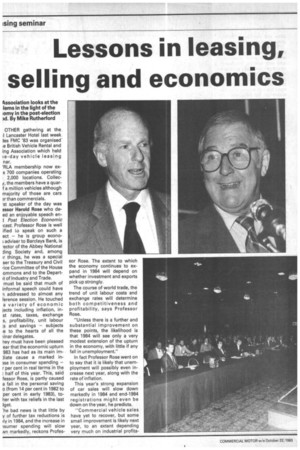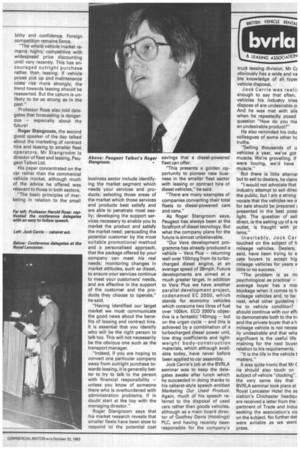Lessons in leasing, selling and economics
Page 62

Page 63

If you've noticed an error in this article please click here to report it so we can fix it.
Association looks at the lems in the light of the iomy in the post-election )d. By Mike Rutherford OTHER gathering at the I Lancaster Hotel last week ies FMC '83 was organised le British Vehicle Rental and ing Association which held le-day vehicle leasing nar.
'RLA membership now exs 700 companies operating 2,000 locations. Collecv, the members have a guarf a million vehicles although majority of those are cars ?r than commercials.
st speaker of the day was Dssor Harold Rose who deed an enjoyable speech en
Post Election Economic cast. Professor Rose is well ified to speak on such a ect — he is group econo; adviser to Barclays Bank, is -ector of the Abbey National iing Society and, among !r things, he was a special ser to the Treasury and Civil ,ice Committee of the House ommons and to the Departit of Industry and Trade.
must be said that much of informal speech could have addressed to almost any fere n ce session. He touched a variety of economic jects including inflation, inst rates, taxes, exchange s, profitability, unit labour :s and savings — subjects .e to the hearts of all the liner delegates.
ney must have been pleased ear that the economic upturn 983 has had as its main im:liate cause a marked in;se in consumer spending — r per cent in real terms in the : half of this year. This, said fessor Rose, is partly caused a fall in the personal saving o (from 14 per cent in 1982 to per cent in early 1983), toher with tax reliefs in the last iget.
he bad news is that little by y of further tax reductions is Jly in 1984, and the increase in ;sumer spending will slow Nn markedly, reckons Profes sor Rose. The extent to which the economy continues to expand in 1984 will depend on whether investment and exports pick up strongly.
The course of world trade, the trend of unit labour costs and exchange rates will determine both competitiveness and profitability, says Professor Rose.
"Unless there is a further and substantial improvement on these points, the likelihood is that 1984 will see only a very modest extension of the upturn in the economy, with little if any fall in unemployment."
In fact Professor Rose went on to say that it is likely that unemployment will possibly even increase next year, along with the rate of inflation.
This year's strong expansion of car sales will slow down markedly in 1984 and end-1984 registrations might even be down on the year, he predicts. "Commercial vehicle sales have yet to recover, but some small improvement is likely next year, to an extent depending very much on industrial profits bility and confidence. Foreign competition remains fierce.
"The whole vehicle market remains highly competitive with widespread price discounting until very recently. This has encouraged outright purchase rather than leasing. If vehicle prices pick up and maintenance costs rise more strongly, the trend towards leasing should be reasserted. But the upturn is un likely to be as strong as in the past."
Professor Rose also told delegates that forecasting is danger ous — especially about the future!
Roger Stangroom, the second guest speaker of the day talked about the marketing of contract hire and leasing to smaller fleet operators. Mr Stang room is director of fleet and leasing, Peugeot Talbot Ltd.
His paper concentrated on the car rather than the commercial vehicle market, although much of the advice he offered was relevant to those in both sectors. "The basic principles of marketing in relation to the small business sector include identifying the market segment which needs your services and products; selecting those areas of the market which those services and products best satisfy and are able to penetrate most easily; developing the support services necessary to enable you to market the product and satisfy the market need; persuading the potential customer by the most suitable promotional method and a personalised approach, that the package offered by your company can meet his real needs; monitoring changes in market attitudes, such as diesel, to ensure your services continue to meet your customers' needs, and are effective in the support of the customer and the products they choose to operate," he said.
"Having identified our target market we must communicate the good news about the benefits of leasing and contract hire. It is essential that you identify who will be the right person to talk too. This will not necessarily be the obvious one such as the transport manager.
"Indeed, if you are hoping to convert one particular company away from outright purchase towards leasing, it is generally better to try to talk to the person. with financial responsibility — unless you know of someone there who is overburdened with administration problems. If in doubt start at the top with the managing director."
Roger Stangroom says that his market research reveals that smaller fleets have been slow to respond to the potential cast savings that a diesel-powered fleet can offer.
"This presents a golden opportunity to pioneer new business in the smaller fleet sector with leasing or contract hire of diesel vehicles," he said.
"There are many examples of companies converting their total fleets to diesel-powered cars and vans."
As Roger Stangroom says, Peugeot has always been at the forefront of diesel tecnology. But what the company plans for the future is almost unbelievable.
"Our Vera development programme has already produced a vehicle — Vera Plus — returning well over 100mpg from its turbocharged diesel engine, at an average speed of 39mph. Future developments are aimed at a much greater target. In addition to Vera Plus we have another parallel development project, codenamed EC 2000, which stands for economy vehicles which consume two litres of fuel over 100km. ECO 2000's objective is a fantastic 140mpg — but on the urgan cycle — and this is achieved by a combination of a turbocharged diesel power unit, low drag coefficients and lightweight body-construction materials, which although available today, have never before been applied to car assembly.
Jock Carrie's job at the BVRLA seminar was to keep the delegates awake after lunch which he succeeded in doing thanks to his cabaret-style speech entitled Marketing Our Used Product. Again, much of his speech referred to the disposal of used cars rather than goods vehicles, although as a main board director of Godfrey Davis (Holdings) PLC, and having recently been responsible for the company's truck leasing division, Mr CC obviously has a wide and va ble knowledge of all type: vehicle disposal.
Jock Carrie was reali enough to say that often, vehicles his industry tries dispose of are undesirable oi And he was met with sile when he repeatedly posed question "How do you ma an undesirable product?"
He also reminded his indu colleagues of some other hc truths.
"Selling thousands of u vehicles a year, we've got muscle. We're grovelling. If were buying, we'd have muscle."
But there is little alternai but to sell to dealers, he claim "I would not advocate that industry attempt to sell direc the public, but I am a strong vocate that the vehicles we o for sale should be prepared presented in the best possi light. The question of sell direct, ie the setting up of a re outlet, is fraught with pr lems."
Inevitably, Jock Car touched on the subject of h mileage vehicles. Dealers, said, have been trying to e cate buyers to accept hig mileage vehicles for years v little or no success.
"The problem is as mi psychological as practical — average buyer has a mer blockage when it comes to h mileage vehicles and, to be nest, what other guideline I he to vehicle condition? should continue with our effc to demonstrate both to the tri and the private buyer that a h mileage vehicle is not neces: ily undesirable and that wha significant is the useful life maining for the next buyer relation to his requirements.
"It is the life in the vehicle t matters."
It was quite ironic that Mr C rie should also touch on subject of vehicle "clocking", the very same day that BVRLA seminar took place at Royal Lancaster Hotel the as ciation's Chichester headqu, ers received a letter from the I partment of Trade and InduE seeking the association's vie on the subject. No further det were avilable as we went press.
































































































